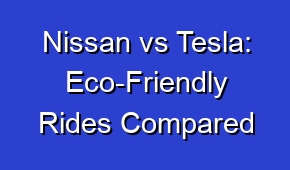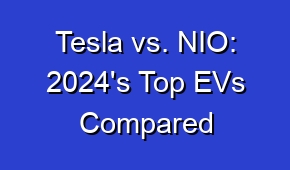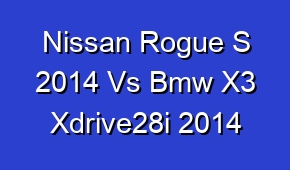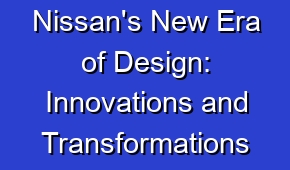Nissan vs Tesla: Eco-Friendly Rides Compared

Compare the eco-friendly rides offered by Nissan and Tesla to make an informed choice. Discover the sustainability features and performance of each brand’s electric vehicles in this comprehensive comparison.
When it comes to eco-friendly rides, the battle between Nissan and Tesla is fierce. Both car manufacturers have made significant strides in producing electric vehicles that are environmentally friendly and sustainable. Nissan, with its Leaf model, offers a practical and affordable option for those looking to reduce their carbon footprint. On the other hand, Tesla has gained popularity with its high-performance electric cars, such as the Model S and Model 3. These vehicles not only offer zero emissions but also provide a luxurious driving experience. While Nissan focuses on accessibility and affordability, Tesla emphasizes innovation and cutting-edge technology. When comparing the two brands, it’s important to consider factors such as range, charging infrastructure, and overall performance. Ultimately, the choice between Nissan and Tesla comes down to individual preferences and priorities in terms of eco-friendliness and driving experience.
| Eco-friendly rides: Nissan vs Tesla |
| The Nissan Leaf is a popular electric car known for its eco-friendly features. |
| Tesla vehicles, such as the Model S and Model 3, are renowned for their sustainability. |
| Both Nissan and Tesla prioritize environmental sustainability in their electric vehicle designs. |
| The Nissan Leaf offers a range of up to 226 miles on a single charge. |
- Tesla cars have longer ranges compared to the Nissan Leaf, with some models exceeding 300 miles.
- The Nissan Leaf is more affordable compared to Tesla’s luxury electric cars.
- Tesla vehicles are equipped with advanced autonomous driving capabilities.
- The Nissan Leaf has a lower starting price, making it accessible to a wider range of consumers.
- Tesla’s Supercharger network provides fast charging options for long-distance travel.
Which is more eco-friendly: Nissan or Tesla?
When it comes to eco-friendly rides, both Nissan and Tesla have made significant advancements in electric vehicle technology. However, there are some differences between the two brands that may impact their overall environmental impact.
| Criteria | Nissan | Tesla |
| Carbon Emissions | Nissan vehicles produce lower carbon emissions compared to traditional gasoline-powered cars. | Tesla vehicles produce zero tailpipe emissions as they are fully electric. |
| Energy Efficiency | Nissan vehicles have good energy efficiency, especially their electric models. | Tesla vehicles are known for their high energy efficiency and longer driving range. |
| Sustainable Materials | Nissan uses some sustainable materials in their vehicles, but not all models have sustainable components. | Tesla incorporates sustainable materials in their vehicle designs, focusing on using recyclable and renewable resources. |
Nissan is known for its Nissan Leaf model, which is a fully electric vehicle that produces zero emissions. The Leaf has been praised for its affordability and practicality, making it a popular choice among environmentally conscious consumers. On the other hand, Tesla offers a range of electric vehicles, including the Model S, Model 3, and Model X. These vehicles are known for their high performance and longer driving ranges.
What are the key features of Nissan electric vehicles?
Nissan electric vehicles come with several key features that make them eco-friendly options. One of the standout features is regenerative braking, which allows the vehicle to recover energy while decelerating or braking. This helps to extend the driving range and improve overall efficiency.
- Long Range: Nissan electric vehicles offer impressive range capabilities, allowing drivers to travel long distances without worrying about running out of battery power. The Nissan Leaf, for example, has a range of up to 226 miles on a single charge.
- Fast Charging: Nissan electric vehicles are equipped with fast charging capabilities, allowing drivers to recharge their vehicles quickly and conveniently. With the use of a DC fast charger, the Nissan Leaf can charge up to 80% in just 40 minutes.
- Advanced Safety Features: Nissan electric vehicles come with advanced safety features to ensure a secure driving experience. These features include intelligent emergency braking, blind spot warning, rear cross traffic alert, and lane departure warning.
In addition, Nissan electric vehicles often come equipped with advanced battery technology, such as lithium-ion batteries, which offer improved energy storage capabilities. Some models also offer quick charging capabilities, allowing for faster charging times and greater convenience for drivers.
What are the advantages of Tesla electric vehicles?
Tesla electric vehicles have gained popularity for several reasons. One of the main advantages is their long driving range, which allows for extended trips without needing to recharge. Tesla vehicles also come with a robust Supercharger network, making it easier for drivers to find charging stations on long journeys.
- Zero Emissions: Tesla electric vehicles produce zero tailpipe emissions, helping to reduce air pollution and combat climate change.
- Lower Operating Costs: Electric vehicles have lower operating costs compared to traditional gasoline-powered cars. Tesla owners can save money on fuel and maintenance expenses.
- High Performance: Tesla electric vehicles offer instant torque and quick acceleration, providing a thrilling driving experience. Models like the Model S Plaid can accelerate from 0 to 60 mph in under 2 seconds.
- Long Range: Tesla electric vehicles have impressive range capabilities, allowing for long-distance travel without the need for frequent recharging. The Tesla Model S Long Range can travel up to 405 miles on a single charge.
- Advanced Autopilot: Tesla vehicles come equipped with advanced autopilot features, including adaptive cruise control, lane-keeping assist, and self-parking capabilities. These features enhance safety and make driving more convenient.
Another advantage of Tesla vehicles is their cutting-edge technology and features. Tesla cars often come equipped with advanced autopilot capabilities, offering semi-autonomous driving features. The vehicles also have sleek designs and luxurious interiors, appealing to those who prioritize both sustainability and style.
Which brand offers more affordable electric vehicles?
When it comes to affordability, Nissan generally offers more budget-friendly options compared to Tesla. The Nissan Leaf, for example, is often considered one of the most affordable electric vehicles on the market. Its lower price point makes it accessible to a wider range of consumers who are looking to make the switch to electric.
| Brand | Affordable Electric Vehicles | Starting Price |
| Tesla | Model 3 | $35,000 |
| Nissan | Leaf | $31,600 |
| Chevrolet | Bolt EV | $36,620 |
Tesla, on the other hand, is known for its premium electric vehicles that come with a higher price tag. While Tesla does offer more expensive models with advanced features and longer driving ranges, they may not be as accessible to those on a tighter budget.
What is the charging infrastructure like for Nissan and Tesla electric vehicles?
Both Nissan and Tesla have invested in developing charging infrastructure to support their electric vehicles. Tesla has built a vast Supercharger network that spans across many countries, offering high-speed charging capabilities. This network allows Tesla owners to easily find charging stations and reduce charging times during long trips.
The charging infrastructure for Nissan and Tesla electric vehicles is well-developed and includes a network of charging stations.
Nissan has also made efforts to expand the availability of charging stations, but their infrastructure may not be as extensive as Tesla’s Supercharger network. However, there are still numerous public charging stations available for Nissan electric vehicle owners, as well as the option to install a home charging station for convenient charging.
What is the warranty coverage for Nissan and Tesla electric vehicles?
Nissan and Tesla offer warranty coverage for their electric vehicles, although the specifics may vary between models and regions. Generally, both brands provide warranty coverage for the battery pack and other major components of their electric vehicles.
Nissan and Tesla electric vehicles come with warranty coverage that varies, including coverage for specific components and mileage limitations.
Nissan typically offers a warranty of 8 years or 100,000 miles for the battery pack, ensuring that customers have peace of mind regarding the performance and longevity of their electric vehicle. Tesla, on the other hand, offers a warranty that varies depending on the model, with some models having a warranty of 8 years and unlimited mileage.
What are the available models for Nissan and Tesla electric vehicles?
Nissan and Tesla offer a range of electric vehicle models to cater to different needs and preferences. Nissan’s lineup includes the popular Nissan Leaf, which is available in various trims and configurations. They also offer the Nissan Ariya, an all-electric SUV with advanced features and a spacious interior.
Nissan Electric Vehicle Models
– Nissan Leaf
– Nissan Ariya
– Nissan e-NV200
Tesla Electric Vehicle Models
– Tesla Model S
– Tesla Model 3
– Tesla Model X
– Tesla Model Y
– Tesla Cybertruck
Additional Nissan and Tesla Electric Vehicle Models
– Nissan IMx
– Nissan BladeGlider
– Tesla Roadster
– Tesla Semi
Tesla, on the other hand, offers several models including the Model S, Model 3, Model X, and Model Y. These models vary in terms of size, performance, and price range, allowing customers to choose the one that best suits their requirements.





















